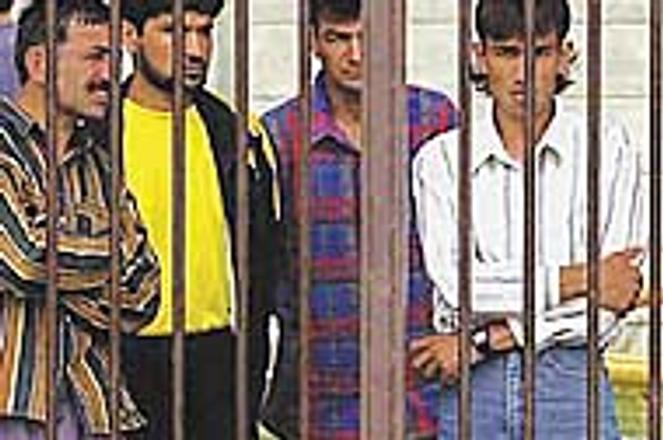MOST refugees in Slovakia are seeking a path to western Europe, say migration officials.photo: Courtesy of UNHCR
SLOVAK officials have rejected claims by a German newspaper that almost 30 Al Qaida and Taliban fighters escaped in early March from a refugee camp in Slovakia and fled west across the border.
The Frankfurter Allgemeine Zeitung wrote on May 22 that the group of suspected terrorists had been intercepted on March 7 by Slovak police on the country's southern border with Hungary, but after requesting asylum had been interned in the unguarded Adamov refugee camp near the Czech and Austrian borders.
By the time Slovak police received information the group might include terrorists and raided the camp on March 12 to arrest them, the Afghans were no longer there, the paper wrote.
The group had been on its way through Bulgaria, Slovakia, Austria and the Czech Republic to the UK, said FAZ, "where they want to regroup and plan possible action".
The story was based on a report by Interpol and Europol, a copy of which was obtained by The Slovak Spectator. On at least one key piece of information - the size of the terrorist group - the report appears inconsistent.
Interpol wrote that the Afghan consul in Bulgaria, 'M.H. Aman', had informed the Slovak embassy in Sofia that "a group of 16 Afghan immigrants, probably members of Al Qaida and Taliban, arrived in Slovakia across the Slovak-Hungarian border on the night of March 6-7."
Slovak police corps vice president Jaroslav Spišiak said police had received the information on March 12, and launched their raid shortly after. He said the Interpol report appeared to have simply assumed the group of 30 migrants actually intercepted were the alleged terrorists in question.
"The information from Bulgaria referred to a group of 16 people, but as a group of 30 was detained here at about the same time, it was just connected because of the coincidence of the date. They guessed that the group of 30 was probably the group of 16."
Spišiak added that police had fingerprinted the group on their arrival at the Adamov camp, and that although he had immediately sent the prints on to western intelligence services, "in no case was it established that one of these people was connected to either of these terrorist organisations."
After a further search of the Brezová pod Bradlom camp, police eventually detained one of the wanted group, Malek Imran, but were forced to release him after the 30 days set by law, when foreign intelligence services were again unable to prove he had any ties to a terrorist group. Imran, too, later escaped from the Gabčíkovo camp.
In another apparent challenge to the Interpol report, the Afghan chargé d'affaires in Sofia, Mohammad Fazel Saifi, denied being the source of the information.
"It's not true. We categorically reject it. We never spoke with the Slovak embassy on this theme. [The FAZ information] is wrong information. I don't know where they got it," he said for the daily Sme.
Slovak Foreign Ministry spokesman Boris Gandel, however, insisted the Afghan embassy had passed on the data.
"We got information that a group of potential terrorists might emigrate through Slovakia to the west. We got this from our embassy in Sofia, which got the information from the embassy of Afghanistan. We passed it on to the Interior Ministry," he said.
"I'm not surprised he [Saifi] said this [denial], because it's a very ticklish problem."
Other officials questioned not only the reliability of the specific details in the report, but also the likelihood that wanted international terrorists would be travelling in packs.
"In the past such people could have used [people] smuggling routes, but maybe you would have had one person who wants to infiltrate a big group of Afghans, Bangladeshis or Indians," said Pierfrancesco Maria Natta, head of the Bratislava office of the United Nations High Commissioner for Refugees (UNHCR).
"This is absolutely different than a group of 30 terrorists, like a big tourist coach, going around Europe saying 'hey, we're here'. It's a bit unlikely."
"Mass smuggling of terrorists is not among the ways the Al Qaida group operates," agreed the German Federal Office for Constitutional Protection, the country's counterespionage unit, in a prepared statement.
Natta added concern at the March 12 Slovak police raid, and said the Adamov camp inhabitants had later told UNHCR that the group of Afghans had not been in any way remarkable.
"The commandos, 20 to 25 policemen heavily armed with ninja [dress], came to the camp and for two hours basically harassed refugees and asylum seekers. They knocked down all the doors, separated the men from the women and children, made them lie on the floor, checked the names and identities and established that these people had left.
"We checked with the people in the camp, but we didn't get any feedback that they [the 30 Afghans] were suspicious or bearded or so on."
Natta added he had been reassured by a meeting with Interior Minister Ivan Šimko, however, who said the incident would not lead to a tightening of Slovakia's refugee policy or to abuses of the rights of asylum seekers.
"The people arriving in refugee camps are not criminal suspects, which is why it is not possible to interfere with their personal freedom," said Šimko.
The Foreign Ministry's Gandel expressed regret that the affair had reached the public at all. "I don't think this is a topic which should be published in the newspaper. It has to be done secretly," he said.



